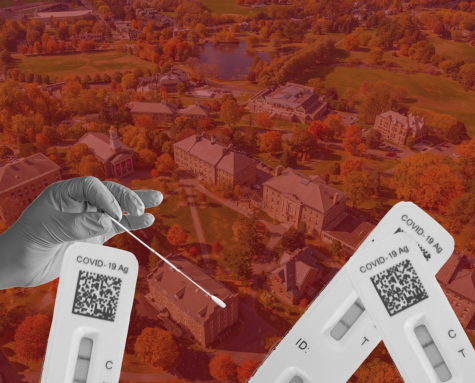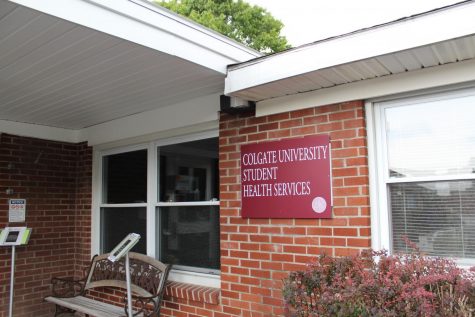University Prepares for Spring Return with Baseline Testing
Amid rising concerns about coronavirus infection rates across the country, the University is preparing to bring students back to campus for the Spring semester with added personnel and baseline testing. This decision came about following the success of the University’s reopening plan during the Fall, in which strict guidelines and protocol mitigated the spread of the virus on campus.
While Associate Vice President for Campus Safety Dan Gough explained Madison County has almost consistently had the highest infection rates in all of New York, the infection rate in the county has been steadily decreasing in the past two weeks, with a current 6% infection rate, down from 10% earlier in January, according to Colgate’s Health Analytics Dashboard.
All returning students, in-person faculty and staff participated in pre-semester testing on Jan. 11, 12 and 13. Of 994 on-campus PCR tests conducted, four employees and zero on-campus students tested positive. Of 2,169 remote tests conducted, 27 students planning to return to campus tested positive, Vice President for Communications Laura Jack wrote in an email to the community Tuesday.
As of Jan. 22, the County Infection Rates is on “high alert” and Community Memorial Hospital capacity, Commitment to Community Health, and Student and Employee Health Education metrics are noted as “moderate alert” on the Health Analytics Dashboard. Employee Quarantine/Isolation and Employee Health Screening are on low alert, and all other metrics are at “new normal.”
“Is it a different world today to start than it was in August? No question. Absolutely… But I would say that our additional layers around more frequent testing this semester is but one additional layer we’ve done to mitigate that additional risk,” Co-Chair of the Task Force on the Reopening of the Colgate Campus (Task Force) Paul McLoughlin said.
McLoughlin and Task Force co-Chair Geoff Holm explained that the success of minimizing coronavirus spread during the Fall semester significantly influenced the decision to return on schedule, given that trends in the fall displayed that cases on campus aren’t necessarily reflective of cases and trends in the county. While the county infection rate rose in the last weeks of the semester, the number of positive student cases on campus remained at zero. This is a symptom, they explained, of the initial universal quarantine and strict travel policies.
McLoughlin and Holm also said there has been no indication from the state that Colgate is expected to delay or cancel their reopening, but rather assistance in the form of rapid antigen testing like those given to the University for pre-departure testing. Additionally, the Task Force looked at the situation at Community Memorial Hospital and determined the situation there is manageable given their ICU, which has 25 beds, has never exceeded a maximum occupancy of 16 beds. Additionally, McLoughlin explained that Colgate’s plan is intended to work in any phase of the pandemic, as protective measures will remain the same.
“What we’re asking you to do, in terms of returning and practicing public health practices, are the same public health practices whether the cases in the county are at 100 or zero. It’s not like you wear two masks, or wear it more often. So I would say just keep doing what you’re doing and allow the plan to work,” McLoughlin said.
The two main things the Task Force will watch going forward is positivity rate and the translation of positives to hospitalizations, as there is concern that the situation in the county could affect students’ ability to remain on campus.
The Spring semester will look different from the fall, most notably with a significant increase in testing; testing will now occur five days a week rather than three and testing 50% of the community every week, an increase from 6% weekly testing last semester. In preparation for increased testing, the University has hired additional personnel, including 12 independent contact tracers who have received certification from the state, anticipating that the Madison County personnel who did contact tracing in the fall will be overwhelmed by vaccine distribution efforts.
Some universities have decided to delay their spring semesters, including nearby Syracuse University and SUNY ESF in Syracuse, causing some community concern that Colgate may do the same. McLoughlin and Holm said that Colgate decided to return on schedule primarily because Colgate is better prepared than other schools like those who have delayed, particularly due to its remote location and the current situation in the county.
Additionally, the Commitment to Community Health for both employees and students include new features. A new four-tiered compliance policy has been adopted for employees. A new potential punishment for students is loss of Gate Card or WiFi access, which has solicited some student concern. McLoughlin explained that this punishment will serve as an interim measure for students who miss weekly testing. Should a student miss multiple rounds of weekly testing, the offense will become a violation of the Commitment.
“The Task Force on Reopening learned from other colleges and universities that regular testing can result in students not participating, thereby compromising the health and safety of others and of the overall plan. These institutions, we learned, implemented a number of measures to ensure compliance with testing, including removing campus access, ability to attend in-person classes, loss of dining hall access, library access, [and more],” McLoughlin said. “We hope we do not need to enforce this and trust students will understand the importance of regular testing of everyone.”
McLoughlin and Holm expressed concern that community members’ “pandemic fatigue” and unrealistic expectations may create behavioral non-compliance.
“I think that it’s hard. We’re all tired of pandemic life; we want to go back to doing the things that we want to normally. [But] we still need to realize the fact that it hasn’t gone away and in fact has gotten worse and so we need to actually even be more vigilant with those kinds of things now than we were in the fall when we came into a situation with relatively low case counts in the area,” Holm said.
Students have expressed mixed opinions around the University’s decision to return on schedule.
First-year Peter Marks explained that he believed returning to campus for the spring semester was a safer option for most students than studying remotely.
“I think it’s [Colgate’s protocol] is strict but I think it’s necessary. So I think, I liked the place we got to later on in the semester, last semester,” Marks said. “We didn’t have any cases spread to the people of Hamilton last semester, so I don’t see that happening again if Colgate’s limiting us through Gate 0 and Gate 1. If we do everything right, there should be no cases on campus to bring in to Hamilton.”
Marks added that he and several of his peers had a positive experience on-campus this past fall and feels grateful that the university has taken necessary precautions to ensure student safety.
Senior Paul Nugent agreed that bringing students back to campus is a safer option than going fully remote, but shared concerns regarding student safety upon arrival.
“[My] biggest concerns are the fact that we’re coming from all over the country, and we’re seeing some really not great looking numbers from a lot of places, and we’re all congregating to upstate NY in the middle of nowhere, something that last semester was a major boom for us, but is something that could very quickly turn bad if people aren’t careful,” Nugent said. “I’m afraid that people will look at what happened last semester, assume that this coming semester is going to be the same, despite the fact that a lot of things have changed, and then kind of become a bit more lax with their own behavior and making excuses for themselves.”
Emily Rahhal is a senior from Los Angeles, California double concentrating in Middle Eastern and Islamic Studies and Religion. She has previously worked...
Greta Ferdinand is a senior from Portsmouth, NH concentrating in mathematics with a minor in philosophy. She has previously served as news editor and contributes...











